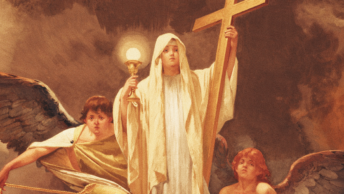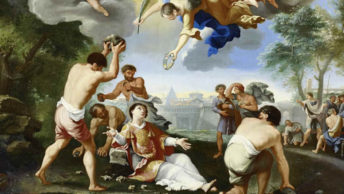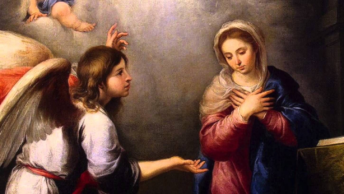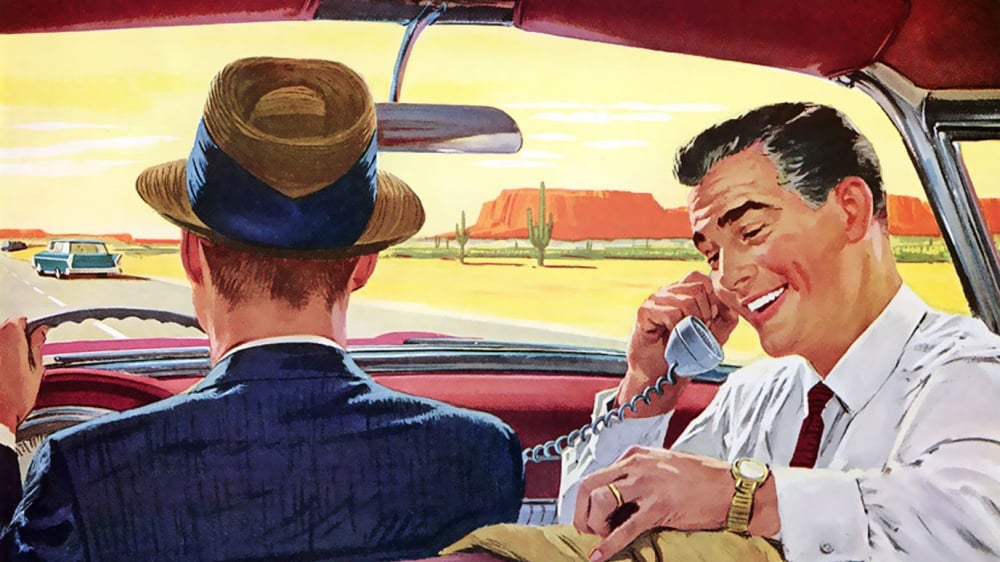Once there was an Indian tribe whose camp was at the base of a great mountain. The land was rugged and life was hard, but the Native Americans persevered. Their chief had led them with wisdom and fairness for many years, but now death was approaching. He called his three sons to him and said, “I am dying, and one of you will succeed me as leader of our tribe. I want each of you to climb our holy mountain and bring back something beautiful. Return here in three days; whoever brings the most outstanding gift will become the new chief.” The young men took their father’s words very seriously, and went off with a sense of purpose and determination; each returned three days later.
The first son brought his father a flower, which he had picked near the summit of the mountain; it was very rare and beautiful, and the father was pleased. The second son handed his father a beautiful stone which he found in a crevice in the side of the mountain; it was colorful and smooth, having been polished by the rain and the wind, and again the father was pleased. The third son approached, but his hands were empty. He said, “Father, I have brought back nothing to show you. When I stood on the top of the mountain, I saw that on the other side there is a beautiful land filled with green pastures, lush forests, and a crystal lake. Because I had this vision of where our tribe could go for a better life, I was so overwhelmed that I could not bring anything back. I’m sorry.” To the young man’s great surprise, his father answered, “You shall be our tribe’s new leader, for you have brought back the most precious thing of all: the gift of a vision for a better future” (Paul Wharton, Stories and Parables for Preachers and Teachers, p. 29).
Christianity is a religion of hope, for it offers a vision of a glorious new future, and shows us how to obtain or receive what God has promised. Our Advent preparations and longing for Christmas are meant to be a symbol of how we should live our earthly lives: with our eyes and our hearts firmly fixed on our true and eternal home of Heaven.
The readings for the Second Sunday of Advent call us to be a people of hope, and invite us to place our trust in Jesus as the One sent by God. John the Baptist (Mark 1:1-8) appeared in the desert as Christ’s forerunner, calling the people to repentance so that they might be ready for the coming of the Messiah, or Savior. In this way John fulfilled Isaiah’s prophecy (40:1-5, 9-11): “A voice cries out: In the desert prepare the way of the Lord! Make straight in the wasteland a highway for our God!” It takes a certain amount of imagination to proclaim good news in the desert, for that type of terrain is often forbidding, dangerous, and of no practical value to anyone. People of faith, however, know that God can do anything; as Isaiah foretold, “Every valley shall be filled in, every mountain and hill shall be made low; the rugged land shall be made a plain, the rough country, a broad valley. Then the glory of the Lord shall be revealed.” God works wonders for those who trust in Him. Sometimes, however, it’s hard to remember this; our vision of Heaven can be crowded out or distorted by the problems and worries of this life. St. Peter (2 Peter 3:8-14) was addressing one such concern. Why, some of the early Christians wondered, did it seem God’s Kingdom was taking so long to arrive? When would His promises be fulfilled? Was the Church’s belief in Christ’s return possibly mistaken? Peter reassures his readers that God’s timetable is different from our own, and that any so-called “delay” is actually a period of grace so that sinners may repent—for the Lord wants everyone to be saved. It’s important for those of us who believe to hold onto our faith and to strengthen our hope; a new life in Heaven awaits us, but we must do our part by remaining holy and peaceful in God’s sight.
The entertainer Walt Disney, the creator of Disneyland in California, died a few years before the 1971 opening of Disneyworld in Florida. Someone said, “Isn’t it too bad he didn’t live to see this?” One of Disney’s close co-workers said, “He did see it. That’s why it’s here” (Roy B. Zuck, The Speaker’s Quote Book, p. 406). The reality never would have come into existence without Walt Disney first having the vision or dream. In the same way, we are called to be like the Indian chief’s third son—the one who had a vision of a better life for his people, and who would not let anything distract him from it.
The world offers us many glittering and attractive diversions, and some of them truly are helpful, useful, and important—in their proper place. However, the good things God has created become temptations and spiritual dangers if they cause us to forget their Creator. God must come first, for what He offers will last for eternity, while everything the world stands for will pass away. We must remember this, and live as people with a vision. This means three things in particular. First, we must make time for God every day; otherwise, we’ll get bogged down in the concerns and values of this life. It’s not enough only to come here to Mass each weekend; we also need to spend at least a few minutes praying or reading Scripture every day—and not just whenever we can squeeze it in, but at a regular time set aside for just this purpose. Secondly, we must make all our decisions based on what we think God wants us to do. After all, there’s no point in professing Christianity with our words if we then contradict it by our deeds. It should become automatic that when we face a difficult choice or an unpleasant situation or an interesting possibility, we first ask for God’s guidance—for He will bless and protect those who seek to live by the values of His Kingdom instead of those of the world. Thirdly, we must show concern for others, the way the Indian chief’s son thought of what was best for the entire tribe. Heaven will not be a private, individual experience; it will be one of loving unity—and this must also be true of our earthly preparation for it. Treating everyone we meet with love, respect, and practical concern is the most concrete and important sign that we understand, and want to be part of, God’s plan for His people.
As John the Baptist promised, Jesus has baptized us in the Holy Spirit—and this should make all the difference in our approach to life. The Kingdom of Heaven should not only be our goal for the future, but also our motivation and inspiration for how we live here and now.








